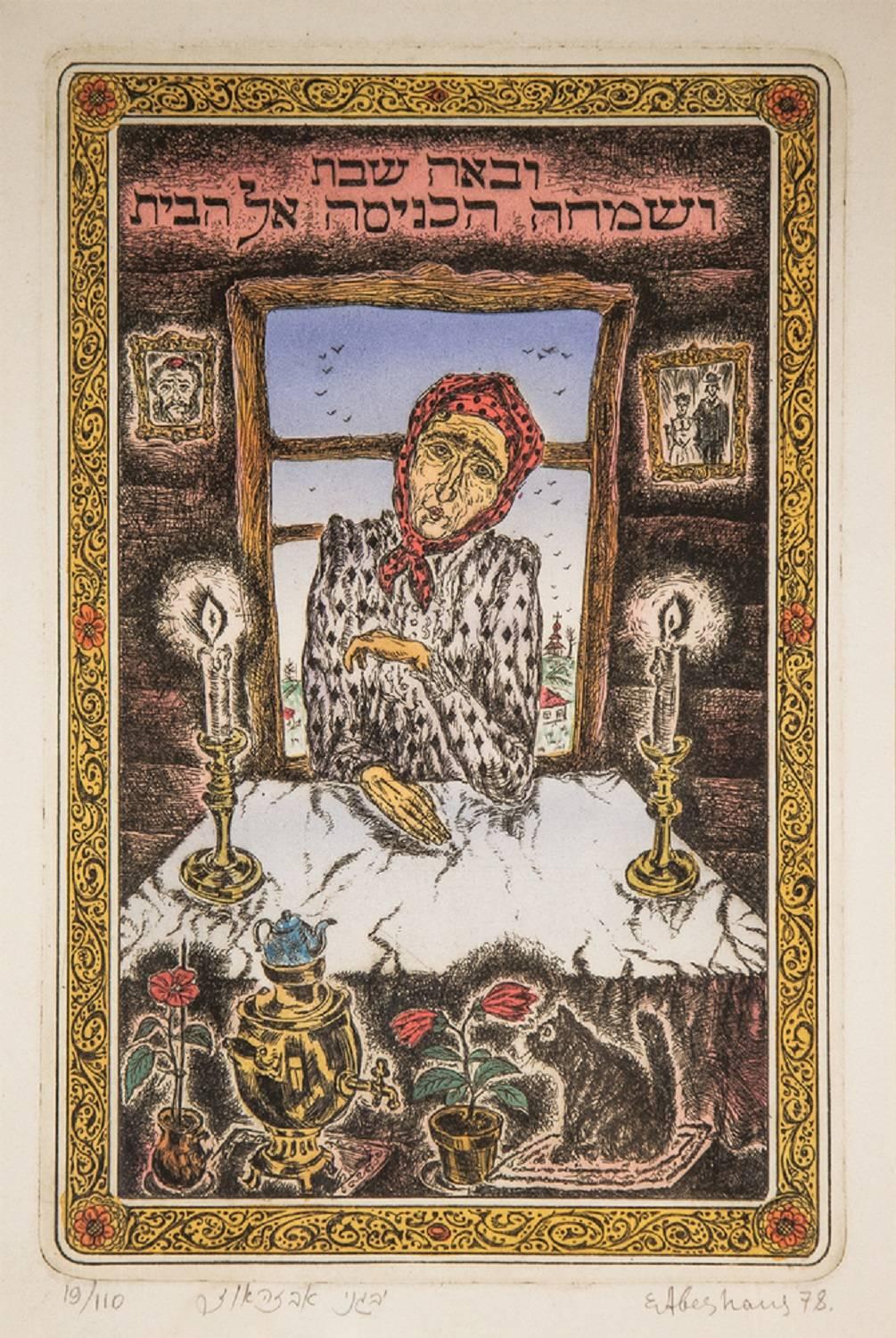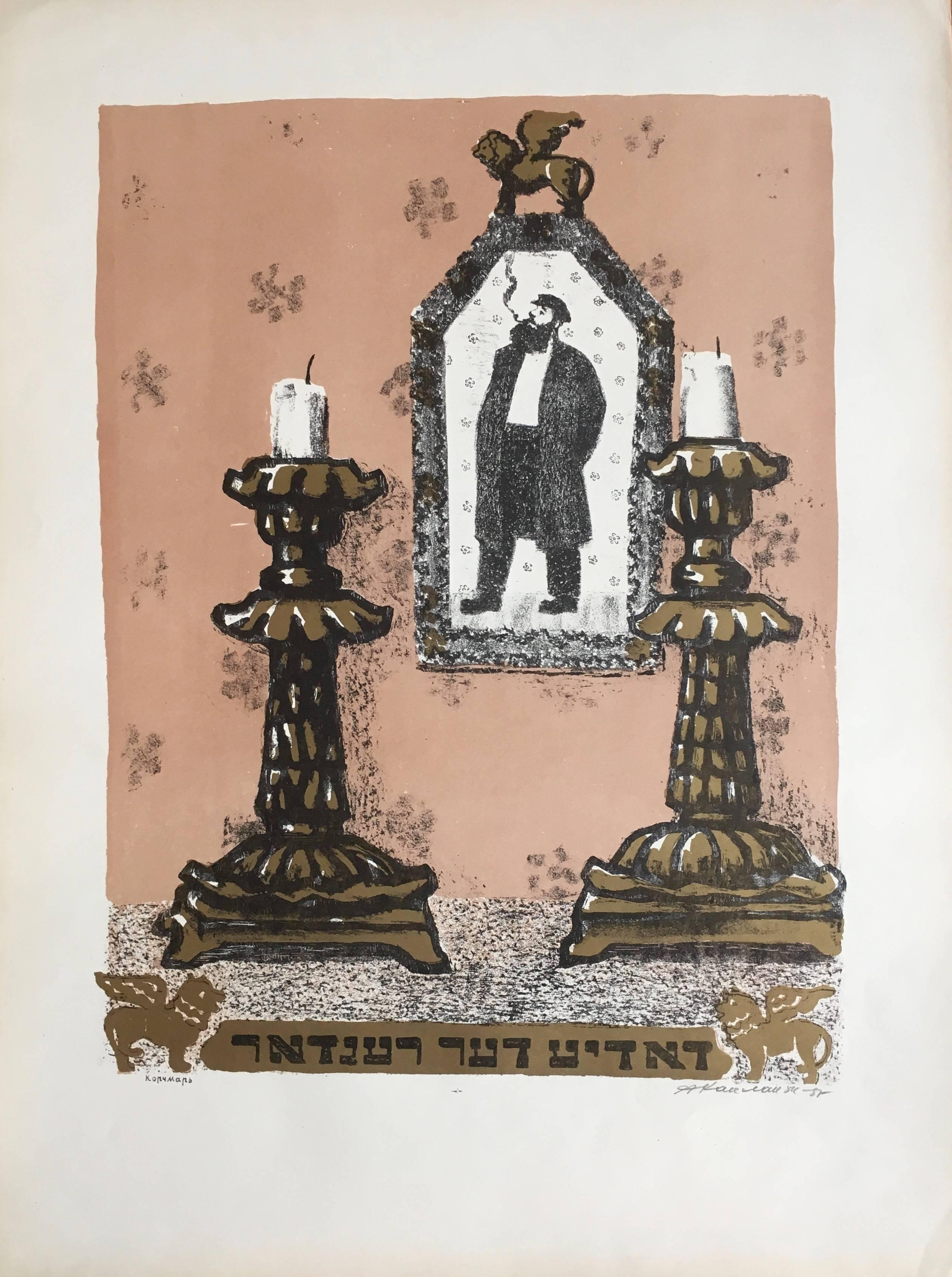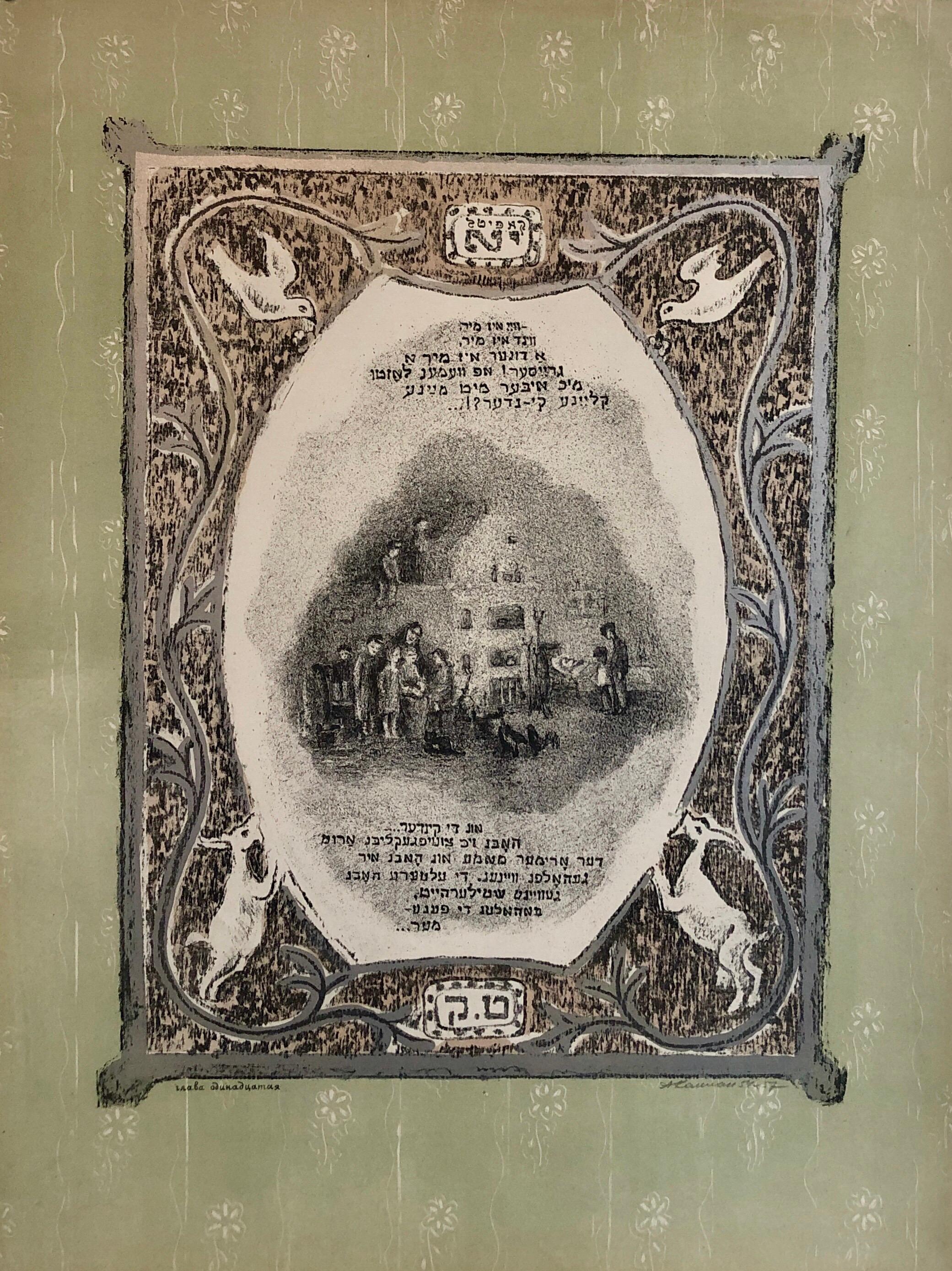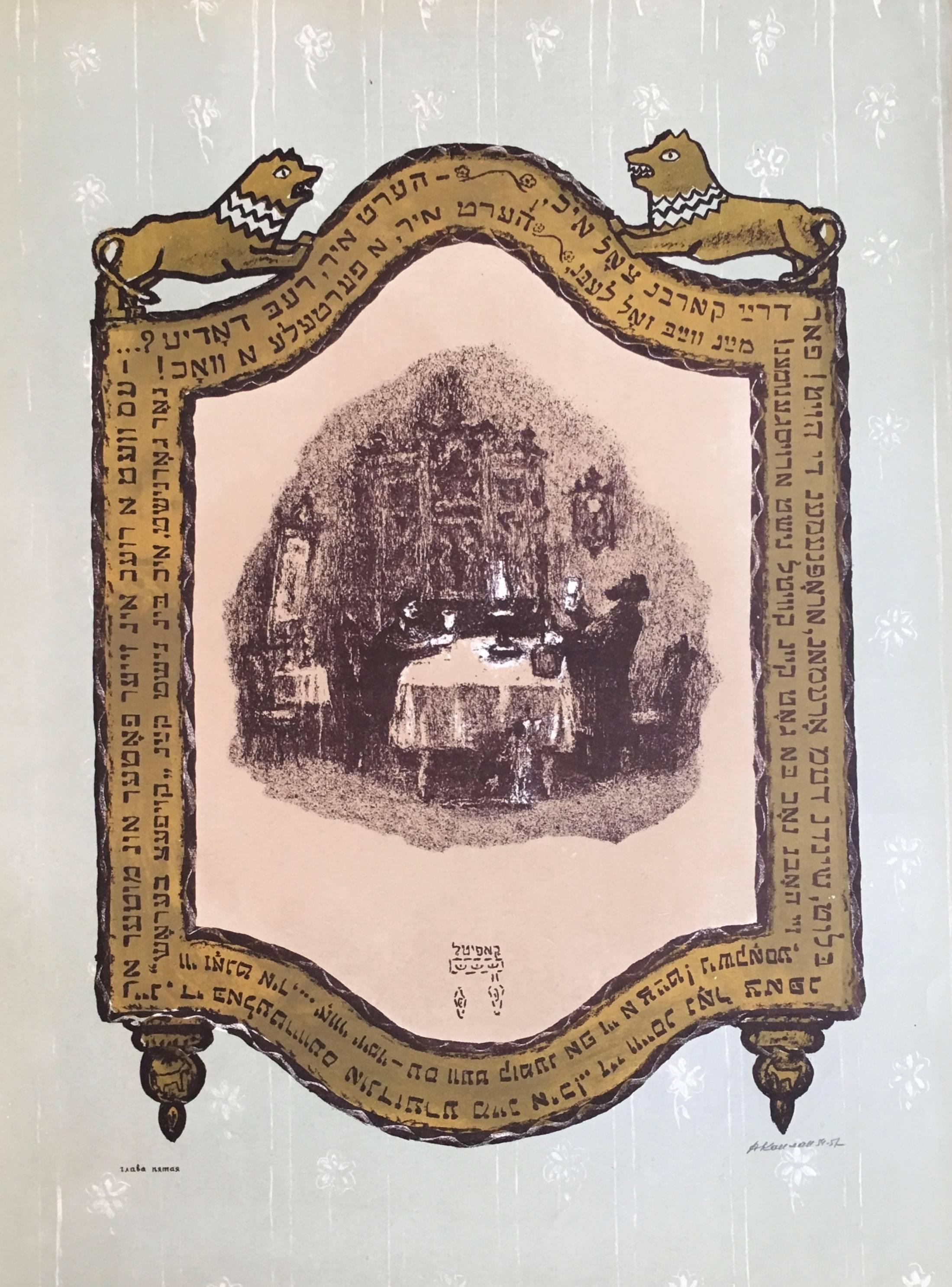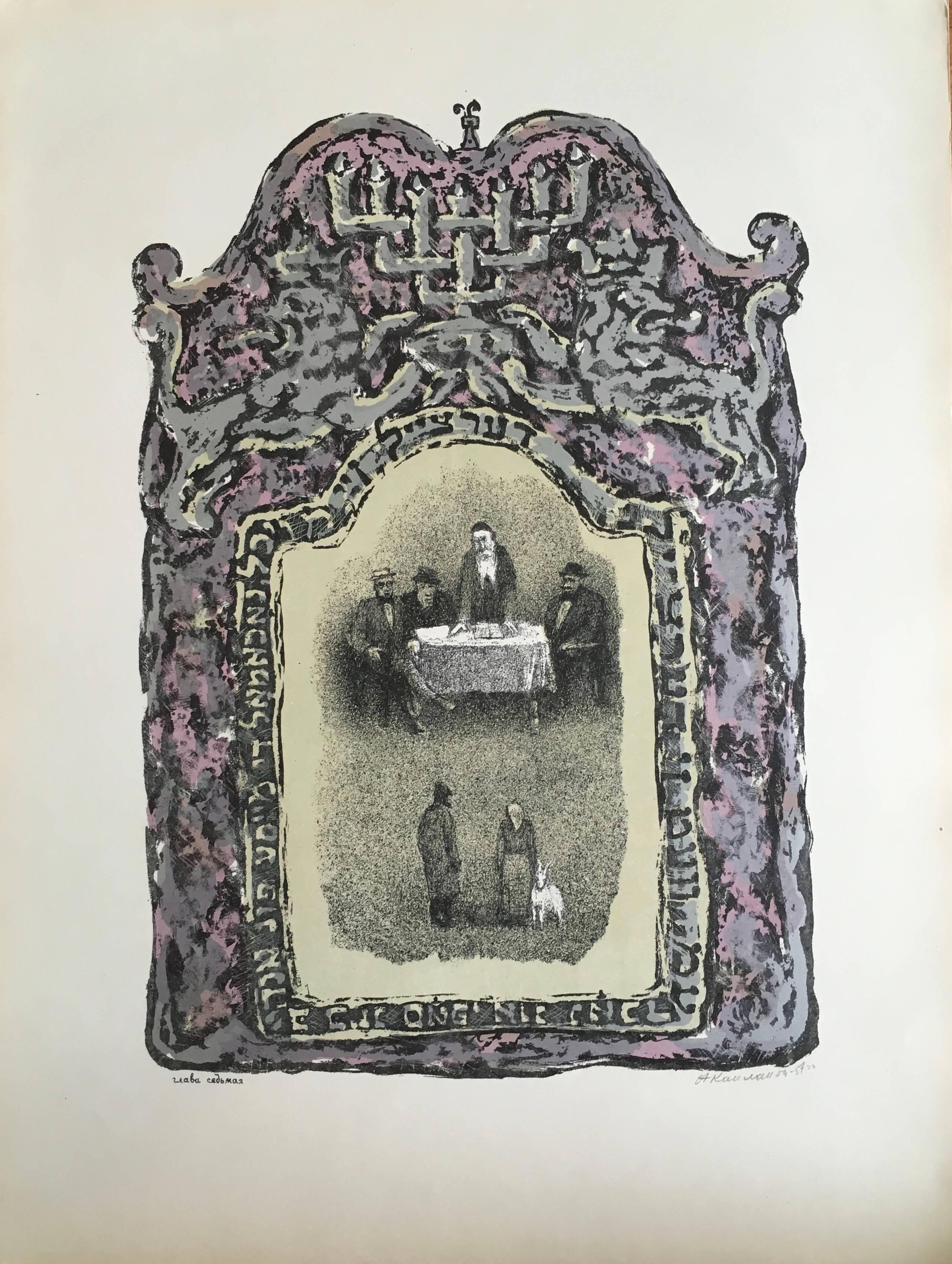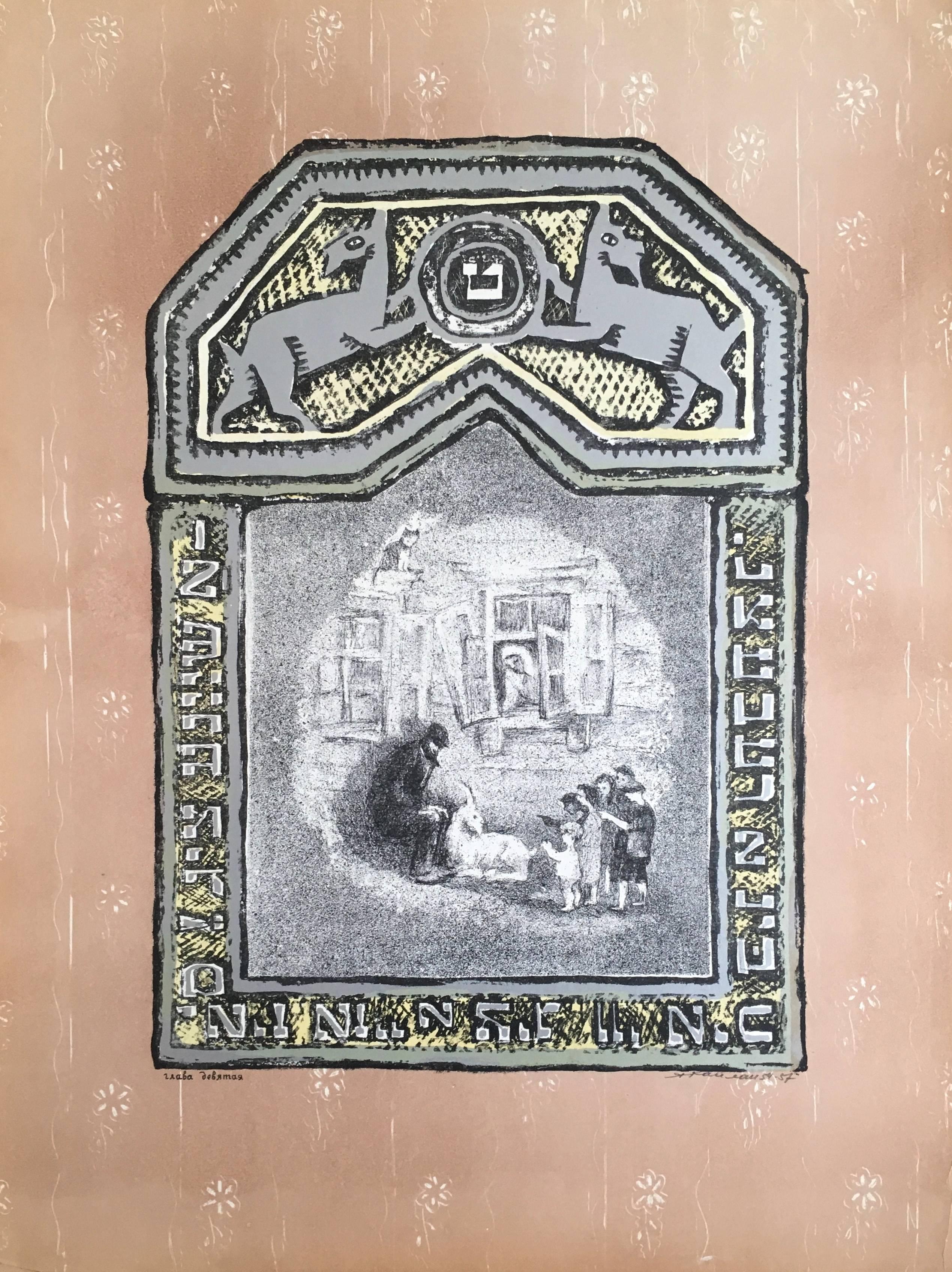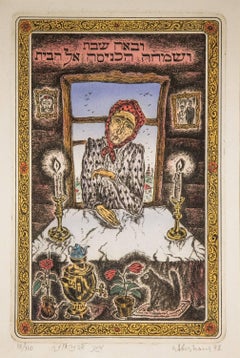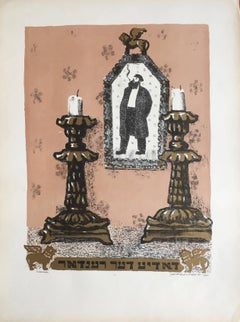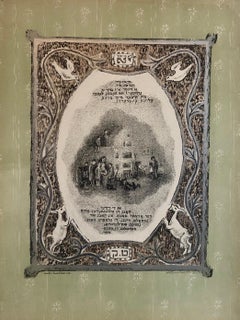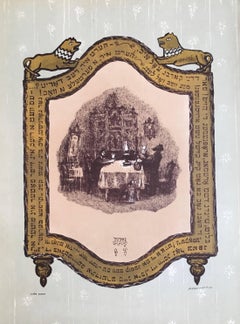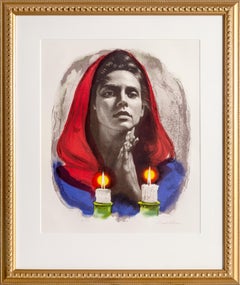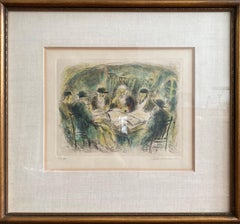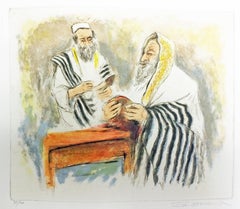Items Similar to Jewish Shtetl Shabbat Candles Russian Judaica Etching w Hand Watercolor Painting
Want more images or videos?
Request additional images or videos from the seller
1 of 10
Eugene AbeshausJewish Shtetl Shabbat Candles Russian Judaica Etching w Hand Watercolor Paintingc.1970's
c.1970's
$950
£716.94
€820.79
CA$1,339.81
A$1,470.95
CHF 767.40
MX$17,800.54
NOK 9,618.14
SEK 9,062.81
DKK 6,126.95
About the Item
EUGENE ABESHAUS Leningrad, Russia, (1939-2008)
Hand-Colored, with watercolor painting, Etching hand signed in pencil in English and Hebrew
Numbered 47/110
Framed 21.5 x 16. image 13.5 x 9
Eugene Abeshaus (also spelled Evgeny Abezgauz, Евгений Абезгауз in Russian; 1939–2008) was a Jewish artist who worked in Russia (then USSR) and Israel.
Born in Leningrad to a typical intelligentsia family, Abeshaus was educated as an electrical engineer but soon abandoned this career and enrolled in the Mukhina School for Applied Art. By the time of his graduation from the famous “Mukha” (Fly in Russian), he had already developed a critical stance towards the official Soviet art dominated by the Communist ideology and began exhibiting at semi-underground exhibitions. This was culminated by his taking part in a famous 1975 exhibition at the Nevsky Palace of Culture. Abeshaus was fired from his job and censured by the official press – which however admitted his "artistic taste, a good sense of color and form".
Soon afterwards, Abeshaus set up, together with several Jewish artists, the Alef Group and became its leader. The group’s first exhibition in November 1975 was held at Abeshauses’ small apartment. According to the Alef Manifesto written by Alek Rapoport, “We are trying to conquer the influence of small-town Jewish art and find sources for our work in deeper, wiser, and more spiritual European culture, and from it build a bridge to today and tomorrow". He was part of a generation of Russian, mostly Jewish artist's that included Oskar Rabin, Evgeny Rukhin, Vladimir Nemukhin, and Alexander Melamid and more. These underground artists opposed the strictures of sanctioned art, experimenting with abstract art, “Sots Art,” the Soviet version of Pop Art, and other unofficial, unsanctioned techniques. These included Yuri Kuper, Komar and Melamid, Eduard Steinberg, Erik Bulatov, Viktor Pivovarov, Vladimir Yankilevsky, Ilya Kabakov, Anatoly Kaplan and Grisha Bruskin. some of the used overt Judaica imagery and Hebrew alphabet in their works.
In May 1976, some of Abeshaus’s works, clandestinely sneaked out of the country, were exhibited at the Berkeley Art Museum to much critical acclaim. Later in the same year, following some political bargain between Leonid Brezhnev and President Jimmy Carter, Abeshaus and his family were finally permitted to leave the USSR for Israel.
Since then Abeshaus lived and worked in Ein Hod, a picturesque artists’ village near Haifa founded by Marcel Janco. His works were exhibited at numerous exhibitions, including dozens one-artist shows, in Israel, USA, Europe and, after the collapse of the USSR, in Russia. His ultimate acceptance and recognition there was culminated in a sensational memorial one-artist exhibition staged in 2009 at the famous Russian Museum in St.Petersburg - an exceptional honor for a modern artist.
- Creator:Eugene Abeshaus (1939)
- Creation Year:c.1970's
- Dimensions:Height: 21.5 in (54.61 cm)Width: 16 in (40.64 cm)
- Medium:
- Movement & Style:
- Period:
- Condition:Measurements include frame. minor wear to frame.
- Gallery Location:Surfside, FL
- Reference Number:1stDibs: LU38214742502
About the Seller
4.9
Platinum Seller
Premium sellers with a 4.7+ rating and 24-hour response times
Established in 1995
1stDibs seller since 2014
1,810 sales on 1stDibs
Typical response time: 1 hour
- ShippingRetrieving quote...Shipping from: Surfside, FL
- Return Policy
Authenticity Guarantee
In the unlikely event there’s an issue with an item’s authenticity, contact us within 1 year for a full refund. DetailsMoney-Back Guarantee
If your item is not as described, is damaged in transit, or does not arrive, contact us within 7 days for a full refund. Details24-Hour Cancellation
You have a 24-hour grace period in which to reconsider your purchase, with no questions asked.Vetted Professional Sellers
Our world-class sellers must adhere to strict standards for service and quality, maintaining the integrity of our listings.Price-Match Guarantee
If you find that a seller listed the same item for a lower price elsewhere, we’ll match it.Trusted Global Delivery
Our best-in-class carrier network provides specialized shipping options worldwide, including custom delivery.More From This Seller
View All"Shabbat Comes and Joy Fills the House" Post Soviet Judaica Etching Hand Colored
By Eugene Abeshaus
Located in Surfside, FL
Hand-Colored Etching Ed. 19/110, signed l.r. in Hebrew, l.l. in English.
EUGENE ABESHAUS Leningrad, Russia, b. 1939, d. 2008
Eugene Abeshaus (also spelled Evgeny Abezgauz, Евгений ...
Category
20th Century Modern Figurative Prints
Materials
Archival Paper, Etching
VIntage Russian Shtetl Shabbat Candlesticks, Judaica Lithograph
By Anatoli Lvovich Kaplan
Located in Surfside, FL
Pencil signed and dated, colored Judaica Lithograph.
Anatoli Lwowitch Kaplan was a Russian painter, sculptor and printmaker, whose works often reflect his Jewish origins.
His fathe...
Category
Mid-20th Century Modern More Prints
Materials
Lithograph
Vintage Russian Ukrainian Shtetl Scene Judaica Lithograph Jewish Portrait
By Anatoli Lvovich Kaplan
Located in Surfside, FL
Pencil signed and dated, Judaica Lithograph.
Anatoli Lwowitch Kaplan was a Russian painter, sculptor and printmaker, whose works often reflect his Jewish origins.
His father was a b...
Category
Mid-20th Century Modern More Prints
Materials
Lithograph
Vintage Russian Shtetl Scene, Judaica Lithograph
By Anatoli Lvovich Kaplan
Located in Surfside, FL
Pencil signed and dated, colored Judaica Lithograph.
Anatoli Lwowitch Kaplan was a Russian painter, sculptor and printmaker, whose works often reflect his Jewish origins.
his father was a butcher in Rahachow which was at that time within the Jewish Pale of Settlement in Russia. His background was therefore not dissimilar to that of Marc Chagall, born a generation earlier in 1887, and although their lives were very different, their art has much in common. The shtetl figures in many of Kaplan's paintings - autobiographical references are very clear in The Butcher's Shop (1972) and Tailor's Shops (1975) and in the many illustrations which he was to create to the works of Sholem Aleichem...
Category
Mid-20th Century Modern More Prints
Materials
Lithograph
VIntage Russian Shtetl Scene, Judaica Lithograph
By Anatoli Lvovich Kaplan
Located in Surfside, FL
Pencil signed and dated, colored Judaica Lithograph.
Anatoli Lwowitch Kaplan was a Russian painter, sculptor and printmaker, whose works often reflect his Jewish origins.
His father...
Category
Mid-20th Century Modern More Prints
Materials
Lithograph
Vintage Russian Shtetl Scene, Judaica Lithograph
By Anatoli Lvovich Kaplan
Located in Surfside, FL
Pencil signed and dated, colored Judaica Lithograph.
Anatoli Lwowitch Kaplan was a Russian painter, sculptor and printmaker, whose works often refl...
Category
Mid-20th Century Modern More Prints
Materials
Lithograph
You May Also Like
Shabbas Candles, American Modern Lithograph by Sandu Liberman
By Sandu Liberman
Located in Long Island City, NY
Shabbas Candles by Sandu Liberman, Romanian/Israeli (1923–1977)
Date: circa 1970
Edition: 64/175
Lithograph, signed in pencil
Image Size: 20 x 13 inches
Size: 30 x 21.5 in. (76.2 x 5...
Category
1970s American Modern Figurative Prints
Materials
Lithograph
Reading the Torah, Modern Hand Colored Etching by Ira Moskowitz
By Ira Moskowitz
Located in Long Island City, NY
Ira Moskowitz, Polish/American (1912 - 2001) - Reading the Torah, Medium: Hand Colored Etching, signed and numbered, Edition: 5/120, Size: 11 x 13.5 in. (27.94 x 34.29 cm), Frame S...
Category
1960s Modern Figurative Prints
Materials
Etching
Challah, Folk Art Etching with Aquatint by Ira Moskowitz
By Ira Moskowitz
Located in Long Island City, NY
Ira Moskowitz, Polish/American (1912 - 2001) - Challah, Year: circa 1970, Medium: Etching with Aquatint, signed and numbered in pencil, Edition: 45/120, Size: 10 x 11.75 in. (25.4 ...
Category
1970s Folk Art Figurative Prints
Materials
Etching
Marc Chagall - The Candlestick - Original Lithograph
By Marc Chagall
Located in Collonge Bellerive, Geneve, CH
The Candlestick, from Jean Leymarie, Vitraux pour Jérusalem (Jerusalem Windows), André Sauret, Monte Carlo, 1962 (see M. 366-72; see C. books ...
Category
1960s Surrealist Figurative Prints
Materials
Lithograph
SABBATH ANGELS Signed Lithograph, Watercolor Abstract Female Figures Candles
By Chaim Gross
Located in Union City, NJ
SABBATH ANGELS is an original hand drawn lithograph(not a photo reproduction or digital print) by the American artist/sculptor Chaim Gross, presenting an impressive sculptural drawing of two majestic female angels welcoming the sabbath as two lit candlesticks glow beneath the wings of the yellow angel. SABBATH ANGELS was hand proofed and printed from lithographic plates on archival Arches paper, 100% acid free. SABBATH ANGELS is a contemporary style angel portrait measuring 14 x 20.5 inches, image size is 9.25 x 15 inches, a very fine impression pulled from hand drawn lithography plates. Printed in transparent watercolor shades of light blue, light brown red, yellow and graphite black for the pencil drawing using the age-old hand printing methods first used in fine art lithography printmaking.
Chaim Gross,(1904 - 1991) was a sculptor, artist, and teacher, known for his wood carvings, sculptures of moving human figures, religious imagery, acrobats, mothers and children. Chaim was born on March 17, 1904 to a Jewish family in Austrian Galicia, in the village of Wolowa in the Carpathian Mountains. In 1911, his family moved to Kolomyia. During World War I, Russian forces invaded Austria-Hungary; amidst the turmoil, the Grosses fled Kolomyia. They returned when Austria retook the town in 1915, refugees of the war. When World War I ended, Gross and brother Avrom-Leib went to Budapest, where Gross attended the city's art academy and studied with painter Béla Uitz, though within a year a new regime under Miklos Horthy took over and attempted to expel all Jews and foreigners from the country. After being deported from Hungary, Gross began art studies at the Kunstgewerbeschule in Vienna shortly before emigrating to New York City in 1921.
In the U.S., Gross's studies continued at the Beaux-Arts Institute of Design, where he studied sculpture with Elie Nadelman and others, and at the Art Students League, with sculptor Robert Laurent. He also attended the Educational Alliance Art School, studying under Abbo Ostrowsky. In the late 1920s and early 1930s Gross exhibited at the Salons of America exhibitions at the Anderson Galleries and, beginning in 1928, at the Whitney Studio Club (the precursor to the Whitney Museum of American Art). In March 1932 Gross had his first solo exhibition at Gallery 144 in New York City. Also in 1932, Gross married Renee Nechin (1909-2005), and they had two children, Yehuda and Mimi (Mimi Gross is a New York-based artist, and was married to the artist Red Grooms from 1963-1976).
In 1933, Gross joined the government's PWAP (Public Works of Art Project), which transitioned into the WPA (Works Progress Administration). Under these programs Gross taught and demonstrated art, made sculptures for schools and public colleges, and created works for Federal buildings including the Federal Trade Commission Building, and for the France Overseas and Finnish Buildings at the 1939 New York World's Fair. Gross was also recognized during these years with a silver medal at the 1937 Exposition universelle in Paris. Chaim Gross, Sculptor by Josef Vincent Lombardo, the first major book on Gross, came out in 1949 and included a catalogue raisonne of his sculpture.
In the 1950s Gross began to make more bronze sculptures alongside his wood and stone pieces, and in 1957 and 1959 he traveled to Rome to work with famed bronze foundries including the Nicci foundry. In 1959, a survey of Gross's sculpture in wood, stone, and bronze was featured in the exhibit Four American Expressionists curated by Lloyd Goodrich at the Whitney Museum of American Art, with work by Abraham Rattner, Doris Caesar, and Karl Knaths. In 1963, Gross and his family moved from their longtime residence at 30 W. 105th Street to Greenwich Village, following the purchase of a four-story historic townhouse at 526 LaGuardia Place, which is now the Renee & Chaim Gross Foundation.
In 1974, the Smithsonian American Art Museum held the exhibition, Chaim Gross: Sculpture and Drawings, and in 1976, a selection from Gross's important collection of historic African...
Category
1980s Contemporary Portrait Prints
Materials
Lithograph
YASHIVA IN JERUSALEM (JUDAICA ART)
By Amram Ebgi
Located in Aventura, FL
Embossed lithograph with foil stamping on paper. Hand signed and numbered by the artist. From the edition of 300.
Artwork is in excellent condition. Certificate of authenticity in...
Category
Late 20th Century Contemporary Figurative Prints
Materials
Foil
$100 Sale Price
50% Off
More Ways To Browse
Shabbat Candle
Judaica Candle
Les Cavaliers Dali
Les Vitraux
Love Me Kulig
Magritte Poster
Marc Chagall 1974
Marc Chagall Cote Azur
Marc Chagall King David
Marc Chagall Metropolitan Opera Poster
Matisse Nadia
Montreux Jazz Poster
Murakami Francis
Nuremberg Chronicle
Oreo Art
Orientalist Prints Art
Paul Mccrane
Peter Max Moon
